How To Prepare Your Asphalt For The Winter?
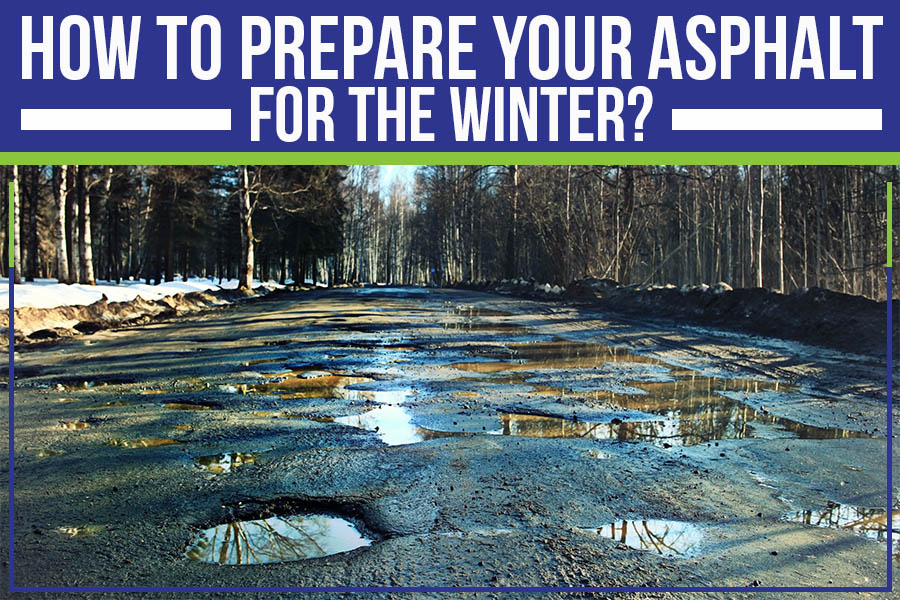
Key Takeaways
- Asphalt is susceptible to damage during winter due to freezing temperatures and expansion and contraction from freezing and thawing.
- Several ways to prepare your asphalt for winter to prevent or minimize damage include sealing cracks, filling potholes, and repaving.
- It’s also important to keep an eye on your drainage system and make sure gutters are clean and clear so they can do their job properly.
- Taking these precautions can help keep your asphalt in good condition and prolong its lifespan.
- Hire a professional asphalt maintenance service to keep your asphalt away from potential problems this winter.
As winter quickly approaches, it’s essential to start preparing your home or commercial property for the cold weather. There are several things to consider when it comes to winter maintenance, such as:
- Check the insulation and heating system to ensure they’re in good working order.
- Cleaning up any debris or leaves that may have built up over the summer.
However, one of the parts of the home which are often forgotten are driveways and parking lots.
Winter can be a harsh season – especially for asphalt surfaces. If you’re not prepared, your driveway or parking lot could be in lousy condition come spring. But with the proper steps, you can protect your asphalt and keep it looking good all winter long!
309 Paving Services offers a descriptive guide to help you prepare for the coming snowy season. So read on and understand how to prepare your asphalt for it.
What Happens to Asphalt in Winter?
Asphalt is crucial for creating roads, parking lots, and driveways. According to National Asphalt Pavement Association, asphalt is a primary component in paving more than 94% of paved roads in the U.S.
Asphalt pavements are solid and durable, but the winter weather can still damage them. The cold weather can cause the asphalt to crack and crumble.
Snow and ice can also add weight to the asphalt, leading to cracking. Other than that constant freeze-thaw cycle can also lead to more significant issues of potholes on the asphalt surface. They are a hazard on your driveway or parking lot, increasing the risk of pedestrian accidents and vehicle damage.
In the U.S. alone, potholes annually result in 3$ billion in damages to car owners. Preparing your driveway and parking lot through proper asphalt maintenance is essential.
8 Ways to Prepare Asphalt for Winter
So, now that you’re aware of the threat winter can create for your property. It’s better to be prepared than to cover for damages that occur. Here are some best ways to prepare your asphalt surfaces for the coming winter.
1. Ensure Cleaning of Asphalt Surface
The first and foremost thing you must do is ensure that the asphalt surface is clean. Leaves, twigs, and other debris can damage the asphalt if not removed before winter.
Form a schedule to regularly clean your asphalt driveway or parking lot, or consider hiring a professional to do it for you.
2. Inspect The Surface for Cracks
Once you have cleaned the surface, inspect it for cracks. Asphalt cracks can quickly escalate into larger problems such as potholes.
If there are any, ensure you get them repaired as soon as possible, as they can cause further damage during winter. The best way to fix them is through asphalt crack sealing. Contact a professional asphalt maintenance service to get rid of cracks before the first fall of snow.
3. Applying a Seal Coat:
As temperatures reach water freezing points, it could cause water seeped in to expand, eventually cracking the asphalt surface. Other than that, as driveways and parking lots are prone to oil spills, they could damage the binder inside, causing it to become loose.
The best way to protect from oil and water spills is to seal coat the asphalt. By sealcoating your asphalt, you protect it from harmful weather conditions and elements.
4. Asphalt Patching of Potholes
If your asphalt driveway already has potholes formed before the winter arrives. Asphalt patching is the best way to prevent them from growing and worsening. It is a quick process in which hot mix asphalt is placed into the pothole and compacted.
You can DIY using a shovel if the pothole is minor, but moderate to larger potholes would require professional asphalt maintenance service.
It’s best to fix these issues during the fall, as if the temperature cools down, even more, it could become a challenge to improve.
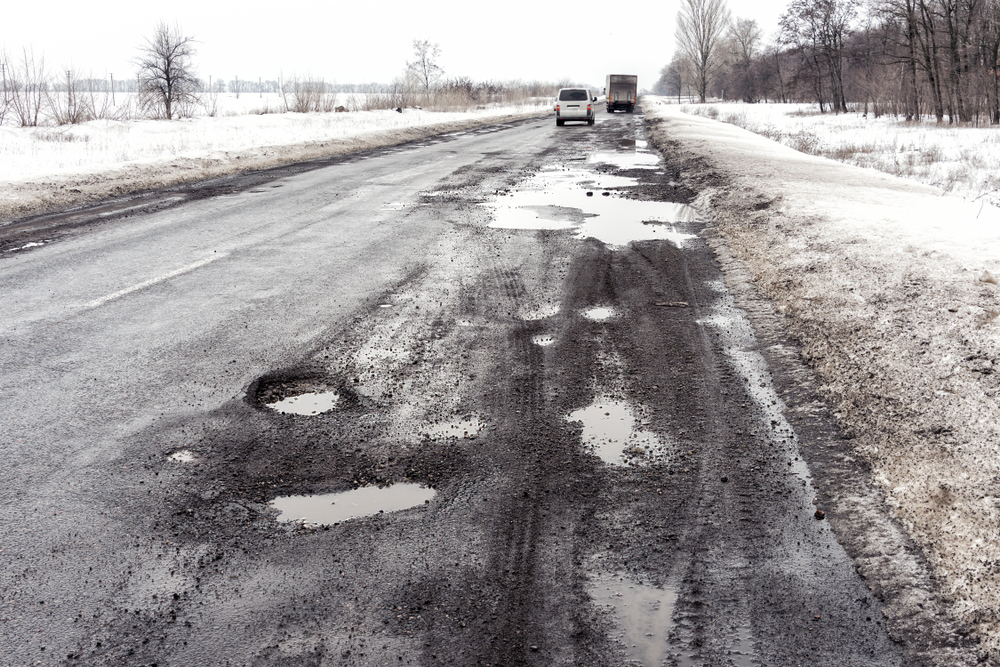
5. Add a Layer of protection.
Adding a layer of protection is another way to help your asphalt driveway during the winter. A liquid asphalt deicer can be sprayed on your driveway as a preventative measure. It will help to keep snow and ice from sticking and forming on your driveway.
It’s essential not to use salt as it can eat away at the asphalt over time and cause even more damage.
6. Have Shovel and Snow Plow at the Ready
If the temperature drops low enough, and often it does, you’ll want to make sure you have a shovel and snow plow ready to help remove any snow that may fall on your driveway.
Keep a shovel near your driveway or parking lot to make snow removal possible.
7. Get Asphalt Paving
Suppose it has been years and your asphalt is already looking worn down. In that case, you should consider getting asphalt paving before you reach winter.
If you live in Illinois, fall is the best time for asphalt paving, considering it receives the lowest amount of rainfall during fall months. Getting your driveway repaved would enhance your home’s curb appeal and make it last longer.
8. Keep an Eye on Your Drainage System
Your drainage system is crucial in keeping your asphalt in good condition during winter.
Ensure that your gutters are clean and clear of any debris so they can adequately do their job.
Also Read: Signs Its Time for Asphalt Driveway Repair
Conclusion
In the end, by preparing your asphalt for the winter, you can help ensure that it will last for many years. By taking the necessary precautions and being proactive about maintenance, you can avoid costly repairs down the road. So don’t wait until winter is upon you to start thinking about your asphalt – now is the time to get started!
If you reside in Normal, IL, and are looking for asphalt maintenance services, consider 309 Paving Services. We are professionals in asphalt paving, sealcoating, crack sealing, etc. Whether you own a huge parking lot or a small driveway, our professional will do the job right – the first time!
Get in touch with us to get a free estimate for your asphalt project.
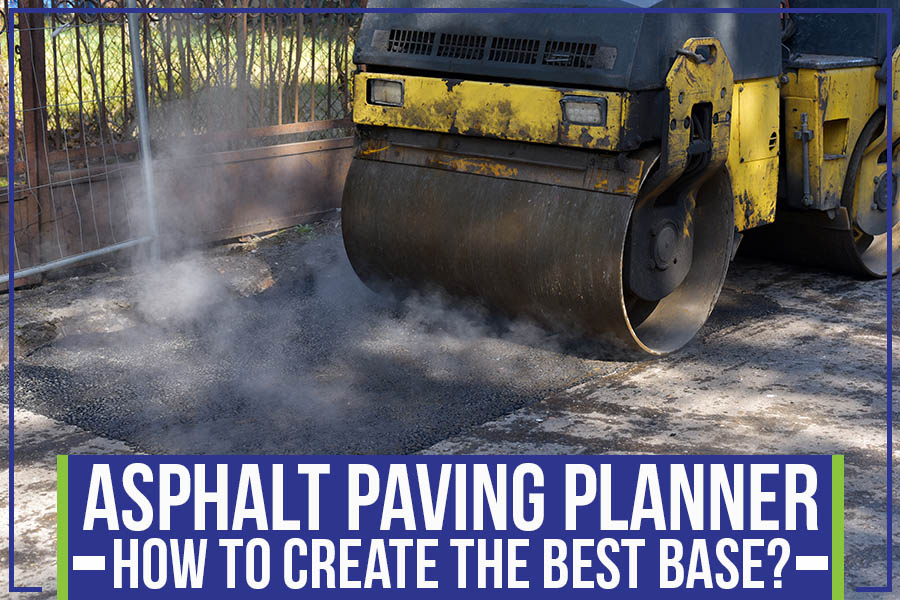
Key Takeaways:
- Asphalt paving is durable, low maintenance, recyclable, has a smooth surface, can be repaired easily, and is affordable.
- Two main types of asphalt paving materials are hot-mix asphalt and cold-mix asphalt.
- Creating a strong base for your asphalt pavement is important. You need to excavate the area where you will install the pavement.
- You will need to compact the soil to create a solid foundation.
There is a lot of mystery and unknowns when it comes to paving. US revenue for asphalt paving, roofing, and manufacturing of saturated materials is projected to reach 26.3 billion US dollars by 2024.
Everything from preparing the surface to what kind of sealant or coating to use seems like a dark art form. But one area where there is some clarity is in the base layer.
This blog post looks at some best practices for creating the foundation for your new pavement. So, if you’re getting ready to pave your driveway or are just curious about how it works – read on! We’ll outline what goes into making a good base and why it’s so important.
How to Make an Asphalt Paving Plan?
When paving a driveway, sidewalk, or patio, it’s important to have a plan. This will ensure that the project is completed promptly and efficiently.
- The first step is to determine the desired layout. You can do this by sketching a rough design or using software to create a more detailed plan.
- Once the layout is finalized, it’s time to select the pavers. There are many different types of pavers available on the market, so it’s important to choose those that best suit the project.
- After the pavers have been selected, it’s time to prepare the area for installation. This includes removing any existing vegetation and grading the soil.
- Once the area is ready, you can install the pavers according to the chosen layout.
- Finally, you can fill any joints between the pavers with sand or mortar.
Creating a beautiful and functional paved surface is easy with a little planning and effort.
Benefits of Asphalt Pavement
1. Asphalt Pavement is Durable
One of the main benefits of asphalt is that it is extremely durable. Asphalt pavement can last for decades with proper maintenance, making it a cost-effective option for commercial and residential applications. Additionally, asphalt pavement can withstand various weather conditions and traffic loads. It’s an ideal choice for high-traffic areas and areas that experience extreme weather conditions.
2. It’s Low Maintenance
Another benefit of asphalt is that it requires very little maintenance. Once asphalt pavement is installed, it does not need to be resealed or repaired like other types of pavement, such as concrete. Additionally, you can clean asphalt pavement easily with just a broom and some water.
3. It’s Recyclable
It is also 100% recyclable, which makes it a very environmentally friendly option. When asphalt pavement reaches the end of its lifespan, the asphalt can be crushed and reused in new asphalt pavements. This recycling process helps reduce the amount of waste that goes into landfills and reduces the need for new materials to be used in paving projects.
4. It has a Smooth Surface
One of the most noticeable benefits of asphalt pavement is its smooth surface. Asphalt pavements are much smoother than concrete pavements, providing a more comfortable ride for drivers and pedestrians. Additionally, a smooth surface helps to reduce noise levels, which is beneficial for both residential and commercial applications.
5. It Can Be Repaired Easily
If damage does occur to asphalt pavement, it can be repaired quickly and easily. You can fill in small cracks and holes with new asphalt, and larger areas can be resurfaced with new asphalt. This repair process is much less disruptive than repairing other types of pavements, such as concrete, and can often be completed in just a few hours.
6. It’s Affordable
It is one of the most inexpensive paving options available today. Compared to other types of pavements, such as concrete or brick pavers, asphalt provides a much more cost-effective solution for commercial and residential applications.
The Different Types of Asphalt Paving Materials
Two main types of asphalt paving materials are hot-mix asphalt and cold-mix asphalt.
Hot mix asphalt is made by mixing aggregate, sand, and bitumen at high temperatures, then compacting it to form a solid surface.
Cold mix asphalt is made by mixing aggregate, sand, and a bitumen emulsion, a mixture of water and bitumen.
Both types of paving materials have their advantages and disadvantages.
Hot-mix asphalt is more durable and weather-resistant than cold-mix asphalt, making it the best choice for high-traffic areas. However, it is also more expensive to produce and lay down.
Cold mix asphalt is less durable than hot mix asphalt but is much cheaper to produce. It can be used in a wider range of temperature conditions than hot mix asphalt, making it the best choice for areas that experience extreme temperatures.
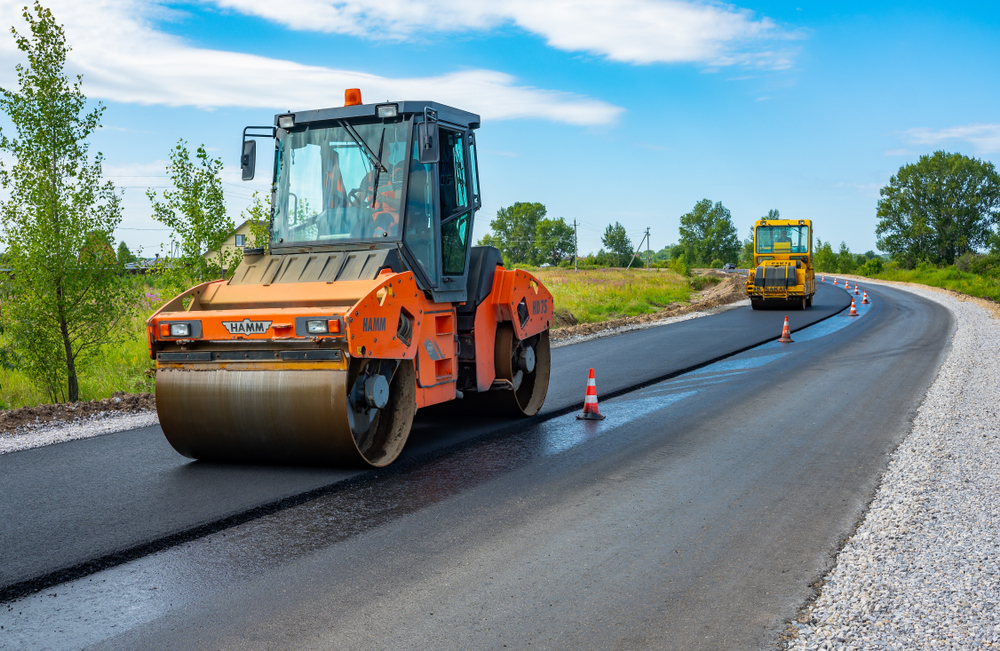
How To Create the Best Base for Your Project?
1. The first step in creating a strong base for your asphalt pavement is to excavate the area where you will install the pavement. This step requires you to remove loose soil, rocks, or other debris that could undermine the pavement’s strength.
2. Once the area has been excavated, you will need to compact the soil to create a solid foundation. There are a variety of methods that you can use to compact soil, such as tamping or rolling.
- The next step is installing a gravel layer over the compacted soil. The gravel layer’s thickness will depend on your project’s specific needs. Still, it is typically between 4 and 8 inches thick.
- After the gravel layer has been installed, you will need to install a layer of asphalt over top of it. The thickness of this layer will also depend on the specific needs of your project. Still, it is typically between 2 and 4 inches thick.
- Once the asphalt has been installed, you will need to compact it to create a strong bond between the asphalt and the underlying gravel layer. Again, there are a variety of methods that you can use to compact asphalt, such as tamping or rolling.
6. Finally, you will need to install a sealant layer over the top of the asphalt to protect it from weathering and wear.
Related: 7 Essentials For Your Fall Asphalt Maintenance Checklist
309 Paving Services Is the Asphalt Paving Company You Can Trust!
309 Paving Services has certified and licensed professionals in Bloomington with years of experience in the asphalt paving industry.
We understand what it takes to get the job done right, and we are insured, so you can rest assured knowing your pavement is in good hands.
Our team will work efficiently to complete your project on time and within budget. You won’t find a better value for your money anywhere else.
5 Reasons Your Business Needs Parking Lot Striping

Key Takeaways
- Parking lot striping is important for the organization and efficiency of your parking lot.
- It’s best to hire professionals to do the job so that it’s done correctly and efficiently.
- It can improve your business’s visual aesthetic, increasing customers and clientele.
- Striping makes your parking lot more efficient by making it easier to find parking spots and by helping people park in the right area.
- It also helps your business comply with legal and parking regulations.
- It can also help improve safety by making it easier to see where people should and shouldn’t be walking.
When you’re running a business, every detail counts. This also includes the parking lot that you own. You must ensure that your customers can easily find a parking spot and safely leave their cars there. Parking lot striping can help make your lot more efficient and easier to use. 309 Paving Services recommends why your business needs to hire a striping contractor.
What is Parking Lot Striping?
Parking lot striping is applying paint or other markings to a parking lot to delineate parking spaces and other areas. This can be done for both aesthetic and functional purposes. Aesthetically, well-striped parking lots can make a property look more attractive and professional. Functionally, striping can help direct traffic flow and make parking easier and safer.
There are a few different methods that can be used for parking lot striping. The most common method is to use paint, which can be applied by hand or machine. Other options include preformed plastic tapes or spraying on a thermoplastic material.
Why do you Need Parking Striping for your business?
As a commercial property owner, you may or may not have a parking lot. But, considering you do, we’ve listed the top reasons professional striping is essential and how it can benefit you and your customers.
1. Visually Appealing
You want your customers to have the best experience possible when they come to your establishment.
Your parking lot is among the first things customers will see when they visit your store or office, so you want it to look good! Neatly painted parking lines make your parking lot look well-kept and professional. First impressions can go a long way in building a solid relationship and improving customer retention.
2. Helps Keep Business in Compliance
As a commercial business owner, you’re responsible for ensuring that your parking lot meets all local parking requirements. This includes having the right number of accessible parking spots for the disabled, crosswalks, and stop signs. Under the American Disability Act (ADA), parking lots must also be well-lit and have parking spaces at least 96 inches wide.
You could face legal action if your parking lot doesn’t meet these requirements. Hiring a professional striping service is best to ensure everything is up to code. This would help keep your business safe.
3. Helps Keep Pedestrians Safe
Pavement marking helps direct traffic flow and keeps pedestrians safe by clearly separating walking areas from driving areas. This is especially crucial in larger parking lots with a higher risk of accidents.
According to studies, 9% of pedestrian deaths occur in the parking lot during backup incidents. Properly striped parking lots ensure customer and pedestrian safety.
4. Prevents Door Dings and Fender Benders
Door dings and fender benders are irritating and costly to repair. Another benefit of line striping is that it can help prevent them from happening. When parking spaces are appropriately marked, drivers are less likely to misjudge their parking and hit another car. It not only saves you money on repairs, but it also helps improve customer satisfaction.
5. Improves Parking Space Efficiency
Line striping can help you make the most of your parking lot space so that traffic flows smoothly and customers can easily find a spot. More parking space would mean more customers can visit your business, which is great for business growth.
Steps to Prepare Your Parking Lot for Striping?
Now that you know the benefits that line striping can bring to your business, it’s time to start the process. But before the professionals arrive to do their job, there are a few things you need to do to prepare.
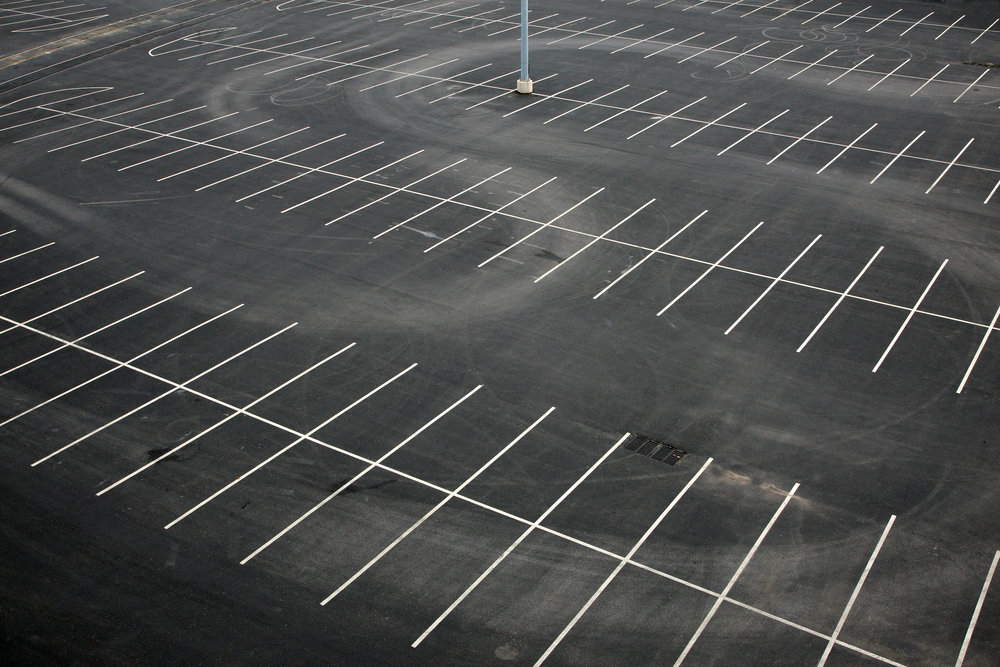
1. Perform a Visual Check
First, take the time to visually check your parking lot. Look for any cracks or potholes that need to be repaired. It’s essential to fix these before striping because the lines will only highlight the imperfections.
Patch these gaps and smooth out the surface. It’s best to call professional pavement maintenance services to do this for you. They have the right tools and materials to do the job quickly and efficiently.
Also Read: How To Protect Your Business & Customers Cars From Potholes
2. Inform your Customers and Make Arrangements for Parking
Second, you must inform your customers that parking lot striping will occur. This is vital if you own a retail business that relies heavily on foot traffic.
Set up signs or barriers to direct traffic flow and ensure plenty of room for parking elsewhere. You don’t want frustrated customers when they can’t find parking spots.
3. Get Dust and Debris Cleared Away
Third, parking lot striping can’t be done on a dirty parking lot. Dust or debris will get in the way of the paint and cause the lines to be imperfect.
This is why cleaning your parking lot before the professionals arrive is important. You want the painted lines to be as crisp and clean as possible.
Keep Moisture Away
Finally, the process requires the parking lot to be completely dry. Having any moisture on the ground will make it difficult for the paint to stick or dry off.
Check the weather before calling in the professionals. You don’t want to have to reschedule because of rain.
Final Thoughts
Parking lot striping is important for the organization and efficiency of your parking lot. It’s best to hire a professional to do the job so that it’s done correctly and efficiently. Keep these five reasons in mind when you plan to stripe your parking lot.
Get Professional Striping by 309 Paving Services in Morton, IL Get in touch with 309 Paving Services in Morton, Illinois, if you’re searching for a skilled striping contractor to enhance the efficiency of your parking lot. We are professional contractors that provide full-service parking lot and pavement maintenance services. We can help you maintain your parking lot or driveway so that it appears to be in excellent condition. Get a quotation for line striping for your parking lot right now.
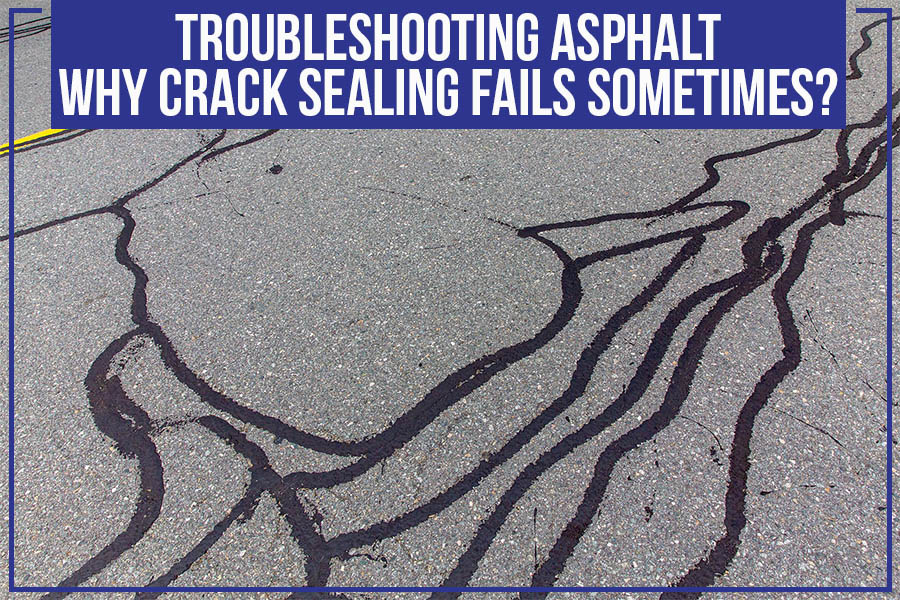
Key Takeaways:
- Asphalt can crack and crumble if not properly maintained.
- Several common causes of asphalt failure include poor drainage, improper installation, and tree root damage.
- Inspecting your driveway or parking lot for problems to regularly prevent asphalt failure and address them as soon as possible is essential.
- Proper maintenance of your asphalt pavement will extend its lifespan and help ensure its long-term success.
Asphalt is a popular material used in driveways and parking lots. Over time, it can crack and need to be repaired. A common repair is to apply a crack sealer, which is meant to fill in the cracks and keep water out. However, many homeowners find their asphalt cracking, even after applying the sealer. So what’s going on? Why isn’t the sealer working? This blog post will explore possible reasons why your crack sealer repair might fail.
What Is Crack Sealer?
It’s a repair method used to fill in cracks in asphalt. It’s a thick, tar-like substance applied using a special applicator. This sealer aims to seal the cracks so that water cannot get into them and cause further damage.
There are two main types of crack sealer: cold and hot. The cold sealer is applied at lower temperatures, while the hot sealer is applied at higher temperatures.
Read: How to seal a driveway?
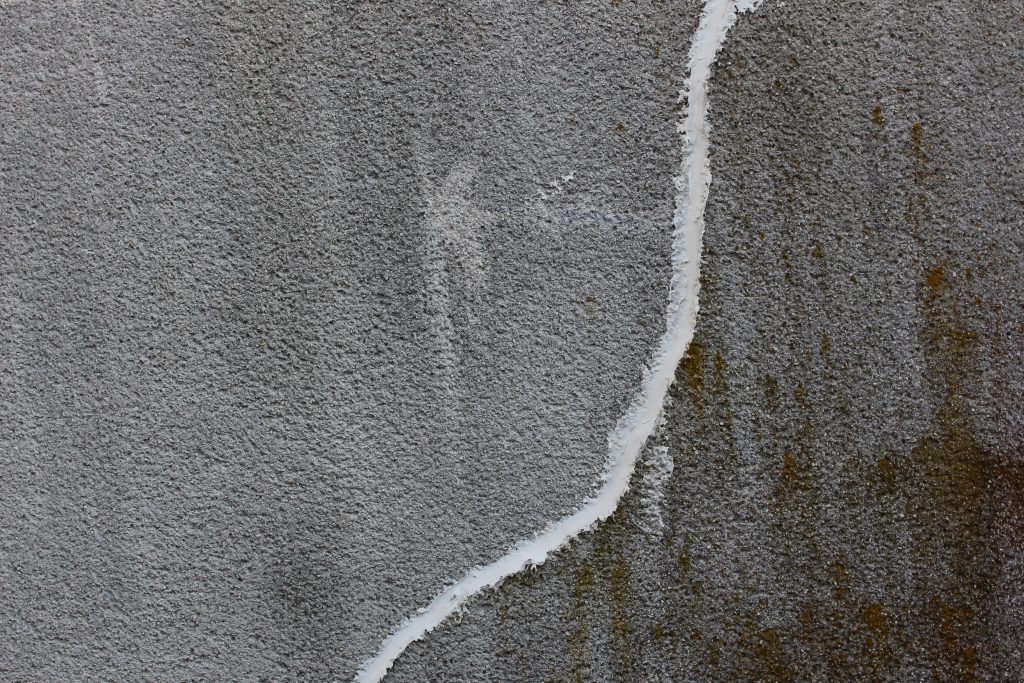
Why Is My Crack Sealer Repair Failing?
There are several reasons why your crack sealer repair might be failing. Let’s take a look at some of the most common causes:
1. The Cracks Are Too Big
If the cracks are more than a quarter inch wide, the sealer cannot fill them correctly. To fix this, use a cold patch or hot mix of asphalt to fill the cracks before applying the crack sealer.
2. The Surface Is Not Clean
If there is any dirt, dust, or debris on the surface of the cracks, then the crack sealer will not be able to adhere properly to the surface. So, you must clean the surface of the cracks with a wire brush or power washer before applying the sealer.
3. The Temperature Is Too Cold
Temperature below 60 degrees Fahrenheit does not allow the sealer to cure properly. You can prevent this problem by waiting for warmer weather before applying the crack sealer.
4. The Crack Sealer Is Old
If the sealer has been in storage for more than a year, it may have gone bad. Buying a new pack of sealers will help you prevent issues caused by old sealers.
Related: Crack sealing vs. crack filling.
The Different Types of Asphalt Cracks & How to Fix Them
1. Alligator Cracks
Alligator cracks are one of the most common types of asphalt cracks. These cracks resemble the skin of an alligator. Alligator cracks are caused by a lack of structural support for the asphalt. Several factors, including poor drainage, excessive traffic, and soil erosion, can impact this. You can repair alligator cracks with a cold patch or hot mix asphalt.
2. Block Cracks
Block cracks are characterized by large, rectangular cracks that run in a linear pattern. Block cracks are caused by shrinkage of the asphalt as it cools. They can also be caused by settlement or the heaving of the underlying soil.
3. Edge Cracks
Edge cracks form along the edges of the asphalt. They are caused by a lack of support at the edges of the asphalt, which can be due to poor drainage or inadequate compaction. Edge cracks can also be caused by thermal cracking when the edges of the asphalt cools faster than the rest of the pavement.
4. Linear Cracks
Linear cracks are long, thin cracks that run in a straight line. They are caused by the contraction and expansion of the asphalt as it heats and cools. Linear cracks can also be caused by the settlement or heaving of the underlying soil. You can repair linear cracks with a cold patch or hot mix asphalt.
Common Causes Of Asphalt Failure And How To Prevent Them
1. Poor Drainage
Asphalt failure is caused by poor drainage. When water is allowed to pool on the surface of the asphalt, it can cause the asphalt to crack and crumble. Ensuring that your asphalt driveway or parking lot has good drainage is critical to prevent this. You can accomplish this by providing a slope to the surface that allows water to run off and installing gutters or drains around the perimeter of the asphalt.
2. UV Damage
Another common cause of asphalt failure is UV damage. Asphalt is a petroleum product, & as such, it is susceptible to damage from ultraviolet rays. Over time, UV damage can cause the asphalt to become brittle and crack.
To prevent this, you must use an asphalt sealer that contains UV protection.
3. Oil & Gas Spills
Oil and gas spills are another common cause of asphalt failure. When these spills occur, they can cause the asphalt to soften and break down.
To prevent this, it is essential to clean up any spills immediately and to avoid parking vehicles in the spill area until it has been cleaned up.
4. Tree Roots
Tree roots are another common cause of asphalt failure. As tree roots grow, they can push up on the surface of the asphalt and cause it to crack and crumble.
Have the trees trimmed away from the edges of your asphalt driveway or parking lot.
5. Improper Installation
Improper installation is another common cause of asphalt failure. If asphalt is not installed correctly, it can lead to cracking, potholes, and other problems.
Hiring a professional with experience installing asphalt driveways and parking lots is critical to ensure proper installation.
Conclusion
Asphalt is a durable material that can withstand significant wear and tear. However, it is not immune to damage and can fail for various reasons. Suppose you are having problems with your asphalt driveway or parking lot. In that case, it is important to troubleshoot the situation to determine the cause. Once the cause of the problem has been determined, you can take steps to repair the damage and prevent similar issues in the future.
309 Paving Services, serving Washington, provides the best crack sealing services. We can prevent water damage, frost heave, and other significant issues with just a few simple steps. So don’t wait until it’s too late – get your free estimate now!
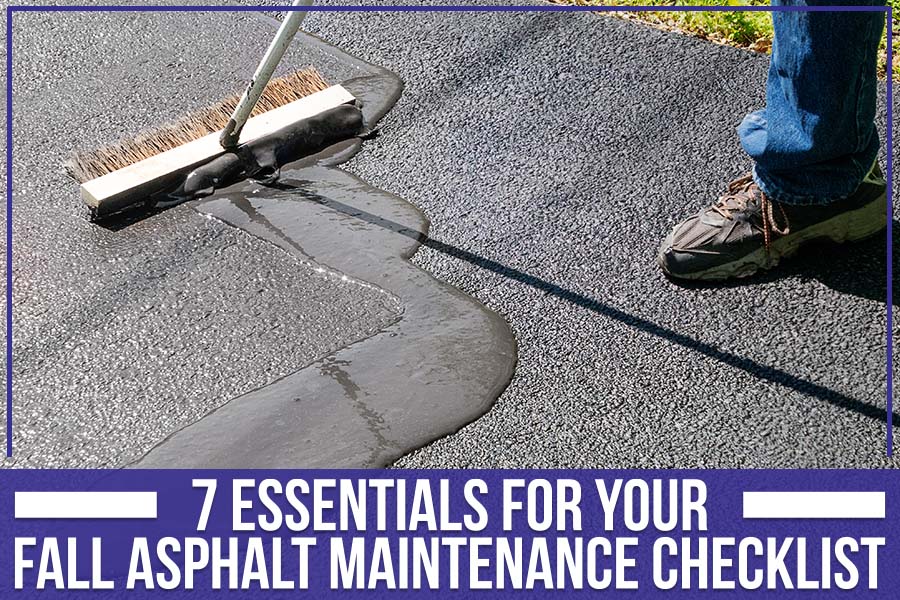
Key Takeaways:
- Asphalt is a long-lasting, recyclable material made from a mixture of gravel, sand, and bitumen. It’s used for road and driveway construction.
- Visual inspection, sweeping, applying sealant, and filling any cracks should all be included in your asphalt maintenance checklist.
- Cracks and potholes, edge damage, and discoloration are early signs of wear and tear and must be addressed immediately.
- Even if you don’t think your asphalt needs any work, it’s best to have a professional inspect it.
As the weather changes, it’s important to take a moment to assess the state of our asphalt driveways & parking lots. If you’re welcoming winter in the next few months, it’s best to perform some much-needed maintenance. Doing so will help to prevent damage from winter weather and keep your pavement looking its best. So, what should you include on your fall asphalt maintenance checklist?
This blog post will discuss all the basics you need to know!
Asphalt: An Overview!
Have you ever wondered what that black, sticky substance is that covers the roads and driveways? That’s asphalt! Asphalt is made from a mixture of gravel, sand, and bitumen, which is then heated and compressed to produce a strong, solid surface.
America’s most recycled product is asphalt! Not paper, plastics, or cardboard. Some studies show that our industry recycles asphalt pavement at a rate of more than 99%. Recycling this material saves American taxpayers over $300 million each year!
Asphalt is commonly used for road construction because it is durable and weatherproof. It can also withstand heavy traffic without showing signs of wear and tear. In addition, asphalt is relatively easy and inexpensive to install. So, the next time you’re driving down the street or pulling into your driveway, take a moment to appreciate the hardworking asphalt that makes it possible!
Your Asphalt Maintenance Checklist
1. Visual Inspection
First, visually inspect the current condition of the asphalt. Are there any cracks or holes? If so, you’ll want to fill them in with an asphalt patching compound. This will help prevent further damage & keep water from seeping into the surface.
Check the edges of your asphalt for signs of wear and tear. If you see any crumbling or cracking, you may need to have the edges repaired or replaced.
2. Sweep Away Dirt & Debris
Give your asphalt a good cleaning regularly. Sweep away any dirt or debris. Then use a hose to remove any remaining dirt or grime. Be sure to let the surface dry completely before applying a fresh coat of sealant.
3. Inspect the Drainage
Make sure your asphalt has proper drainage. If water is pooling on the surface, it could lead to serious damage. Inspect your gutters and downspouts to ensure they are clearing water away from your asphalt. You may need to make adjustments to improve drainage. Poor drainage can cause your pavement to crack and erode.
4. Fill In Cracks and Holes
Asphalt tends to crack and hole over time. This is especially true in areas with a lot of traffic or heavy vehicles. Inspect your asphalt for cracks or holes, then fill them with the appropriate repair product.
5. Apply a Fresh Coat of Sealant
A sealant protects asphalt from weather damage and makes it look fresh and new. If it’s been a few years since you last applied sealant, now is a good time to do it.
6. Remove Any Stains
Stains can make your asphalt look unsightly. You can remove most stains with a power washer or by scrubbing with a stiff brush and some detergent.
7. Inspect the Edges
The edges of your asphalt are vulnerable to weather, traffic, and lawn care equipment damage. Inspect them for any wear or damage and make repairs as necessary.
With these tips, you can keep your asphalt looking great all year!
How to Prevent Future Asphalt Problems?
- Asphalt sealant is a barrier between your pavement and the elements, protecting it from UV damage, water damage, and oil leaks.
- Lawn care equipment can damage your asphalt if it’s not used properly. Be especially careful with power washers; if used with high pressure, they can strip away the top layer of asphalt.
- Asphalt will show signs of wear & tear over time. Look out for cracks, potholes, and other damage so you can repair it before it gets worse.
- Having your asphalt inspected by a professional every few years is a good idea. They can identify any problems and recommend the best course of action.

Some Early Signs
If your driveway or parking lot shows signs of wear and tear, it may be time to consult a professional. But how to tell if the problem is serious enough to warrant repairs? Here are a few key indicators that your asphalt may need some attention:
1. Cracks and Potholes
The most obvious sign that your asphalt needs repair is the presence of cracks or potholes. These can be caused by weather damage, vehicle traffic, and overgrown tree roots. If left unaddressed, cracks and potholes will only worsen, eventually leading to major damage.
2. Edge Damage
Another common issue is edge damage when the edges of your asphalt start to crumble or chip away. This can be caused by improper installation, inefficient drainage, or age and wear. Edge damage can lead to further deterioration of your asphalt, so it’s important to address it as soon as possible.
3. Discoloration
If your asphalt is starting to look dull or faded, it could be a sign that the surface is deteriorating. This usually happens when the material becomes dry and brittle, making it more susceptible to sun, wind, and rain damage. If you notice discoloration, it’s best to have a professional take a look as soon as possible.
While these are all common indicators that your asphalt may need some attention, keep in mind that only a trained professional will be able to give you a definitive answer. If you have any concerns about the condition of your driveway or parking lot, don’t hesitate to reach out to a local contractor for assistance.
Conclusion
Your parking lot and driveway are one of the first things customers or guests see when they visit you. If it’s cracked, faded, and stained, it’s not sending the right message. But you don’t have to accept the wear and tear that comes with owning a property. You can fight back against the damage caused by the sun, rain, snow, and ice with 309 Paving Services’ asphalt maintenance services.
Read: Protect your customers from potholes.
Our coatings create a barrier against the elements, helping your parking lot to stay in great condition for years to come. If you want to keep your parking lot, driveway, or roads looking their best, call 309 Paving Services in Pekin today. Get a free quote for our asphalt maintenance services!
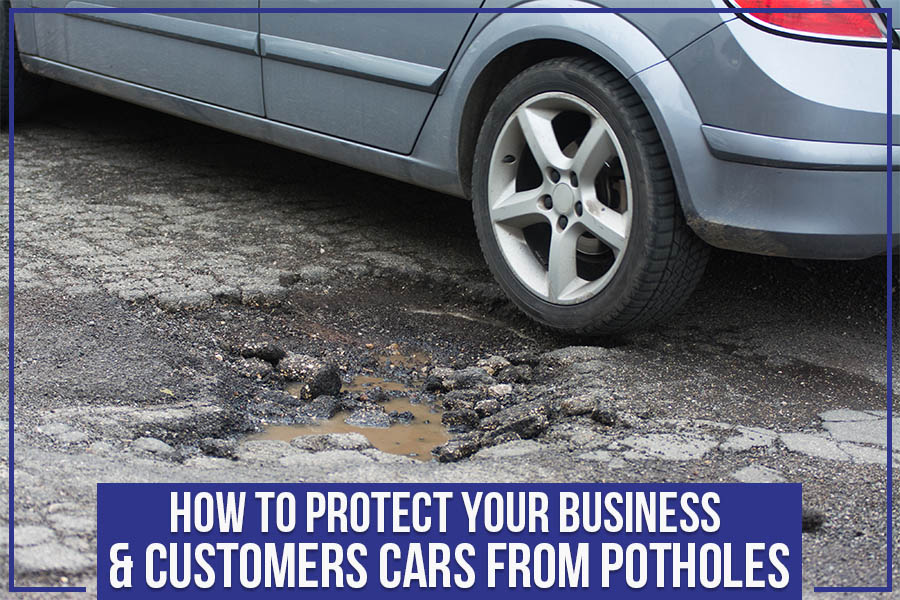
Key Takeaways:
- Beware of the dangers that potholes pose to your business and customers and take steps to avoid them.
- Potholes can severely damage cars, both cosmetically and structurally. They can damage your car’s tires, suspension, and alignment.
- Asphalt contractors can protect your business & customers’ cars from these pothole hazards by filling them in.
- The 309 Paving Services offers asphalt paving services to customers in East Peoria, IL, and the surrounding areas.
Happy customers bring business success. But what happens when their car gets damaged by a pothole on your driveway or parking lot? They might switch to your competitor, who offers better and safer outdoor spaces. That’s why you should regularly check the condition of your asphalt.
An asphalt contractor ensures your business is up to par and can withstand the elements, traffic, and wear and tear. By filling in potholes and repairing cracks in the asphalt, you can help keep your customers safe and keep them from switching to your rivals.
In this article, 309 Paving Services will discuss how an asphalt contractor can help to protect your business and your customers’ cars from the dangers of potholes.
What is a Pothole?
So, what exactly is a pothole? A pothole is a depression in the asphalt surface caused by water seeping into cracks in the pavement and then expanding when it freezes. As cars drive over these areas, the weight of the vehicles causes the asphalt to crumble away, leaving behind a hole.
Potholes vary from a few inches to several feet wide and can be found anywhere. They’re ubiquitous in areas that experience a lot of freeze-thaw cycles. But no matter where you live, you should take precautions against the danger of potholes to protect your business, your customers, and their vehicles!
Major Car Damages Caused by Potholes
Hitting your car in a pothole can damage its steering, tires, suspension, and alignment. The impact of hitting a pothole can also cause cracks or chips in your windshield. In severe cases, hitting a pothole can even cause structural damage to your car. Let’s explore the potential damages to cars that can be caused by potholes in detail:
1. Steering Damage
Your car’s steering system allows you to control the direction of your vehicle. It comprises many components, including the steering wheel, steering column, and power steering pump. Hitting a pothole can damage any of these components, making it difficult or impossible to steer your car, depending on the severity of the impact.
2. Wheels & Tires
Hitting a pothole can cause punctures or blowouts in your tires. But even if your tires don’t suffer any immediate damage, the bump can cause them to misalign or go out of balance. It can bring premature wear and tear and even cause your tires to wobble or shake while driving.
3. Suspension & Shocks
Your car’s suspension system is designed to absorb the impact of bumps and potholes on the road. However, hitting a pothole can damage your car’s shocks or struts and cause your vehicle to handle poorly or pull to one side while driving. In extreme cases, the car’s structure can even suffer badly.
4. Windshield & Windows
You’re driving along, enjoying music, when suddenly, WHAM! A tiny rock hits your windshield as the car moving in front of you goes into a pothole in the road. The piece of debris from the pit is rolled back by the tires of that vehicle, cracking your front glass. And then, if you also hit that pothole hard enough, it can further shatter the screen and might also damage your car’s windows.
5. Body & Paint
Depending on the structure of the pothole, the jolt can chip or crack the paint. In extreme cases, it can even dent or crumple the metal. This damage is often more cosmetic than anything else, but it can still be expensive to repair.
6. Your Car’s Structure
Hitting a pothole can also damage your car’s structure. The force of the impact can loosen or break bolts, crack welds, or damage bushings. In severe incidents, it can even bend or twist the frame. This damage is usually costly to repair and decreases your car’s resale value since the structure cannot possibly be restored to its original shape, condition, and strength.
7. Losing Control of Your Car
If you hit a pothole, there’s a chance that you could lose control of your car. It is especially true if the pothole is deep or if you’re driving at high speeds. A pothole can also cause your vehicle to veer into oncoming traffic or off the road entirely.
8. Safety Hazard for Pedestrians
Potholes can also pose a serious hazard to pedestrians. If someone trips and falls in a pothole, they could sustain serious injuries. And if a driver swerves to avoid hitting a pedestrian and into a pothole, they could end up crashing into something else – like another car.
How to Prevent Potholes
Potholes may seem like minor nuisances, but they can cause a lot of damage. Don’t let potholes ruin your business by harming your customers or their cars. Taking simple precautions can protect your driveway from these hazards.
If you’re unsure whether your asphalt needs repairs, it’s always best to err on the side of caution and have a professional take a look. An asphalt contractor has the experience and knowledge to assess the condition of your surface and make recommendations for repairs.
Here are some tips to prevent pothole damage:
- Inspect your property regularly for any potential hazards.
- If you see a pothole, mark it with a cone or flag, so your customers or employees can avoid it.
- Repair potholes as soon as possible.
- Have an asphalt contractor visit and survey your property to recommend the best course of action.
Also, check out our blog on the signs that it’s time for asphalt driveway repair to ensure your customers get the best experience visiting your business. You may also need to regularly seal coat and stripe your parking lot for aesthetics and safety purposes. An asphalt contractor can help protect your investment and keep your property looking its best!
Need Asphalt Paving Services in East Peoria, IL? No Problem!
Ready to take the plunge? Contact us for a free estimate on your asphalt paving project. 309 Paving Services has 15 years of experience serving East Peoria, IL. Our services include asphalt paving, patching, crack sealing, sealcoating, and parking lot striping. We’ll work with you to develop a plan that meets your needs and fits within your budget, and we guarantee you won’t be disappointed with the results. Our experienced professionals know how to get the job done right, so don’t wait – call us today!

Asphalt is a durable and resilient paving material for driveways that can withstand the weight of many different types of vehicles. Asphalt is the way to go if you want your driveway to last for years to come. You can consider the upfront cost as a long-term investment for something that is functional and improves your home’s curb appeal.
1. Easy Installation & Aesthetically Pleasing
Installing an asphalt driveway is a short process, only taking a couple of days from start to finish. Because asphalt doesn’t need time to cure, you can drive on it shortly after it’s been laid down.
Asphalt comes in various colors and can even be stamped or etched to create a unique look. Whether you want a traditional blacktop driveway or something trendier, you can customize asphalt to suit your style.
2. Asphalt is Very Durable
One of the most important qualities of driveway material is durability. You want something that will not only last but also looks good. Asphalt meets both of those criteria and more.
Asphalt can withstand extreme weather conditions, heavy traffic, and even spilled chemicals without significant damage. Asphalt is also less likely to crack under pressure.
Properly maintained asphalt driveways can last over 20 years before they need to be replaced – making them one of the most durable driveway options available.
3. Asphalt is Low Maintenance
Once your asphalt driveway is installed, you can forget about it. Unlike other materials, asphalt doesn’t require regular sealing or patching. An annual sweep and rinse with a hose are all you need to do to keep it looking its best.
4. Asphalt is an Eco-Friendly Choice
Asphalt is a great option if you are looking for eco-friendly driveway material. It is made from a mix of bitumen and sand, two naturally occurring materials. And, because it can last for decades, you won’t have to replace it as often as other materials – further reducing your carbon footprint.
5. Asphalt is Easy to Repair
If you damage your asphalt driveway, it is fairly easy to repair. You can fill cracks, and you can patch holes relatively easily. And, because asphalt is so durable, the repairs will usually last many years.
6. Asphalt Drives Up Property Value
Investing in an asphalt driveway is a great way to increase the value of your property. Driveways are an important consideration for potential home buyers, and they are often willing to pay more for a home with a beautiful and well-maintained driveway.
So, if you have plans to sell your home in the future, an asphalt driveway may help you get top dollar.
Conclusion
Now that we have enjoyed going over all the important information regarding asphalt driveways, it’s time for you to decide! Asphalt is a durable, low-maintenance, and attractive material that will enhance the look of your home while also adding to its value.
If you’re convinced about getting a new asphalt driveway, don’t hesitate to contact 309 Paving Services in Peoria Heights! We are trained and certified asphalt paving specialists with years of experience in the asphalt paving market.
We know what it takes to get the job done correctly, and we’re insured, so you can relax knowing your driveway is in capable hands.
10 Weird & Wonderful Asphalt Pavement Patching Facts
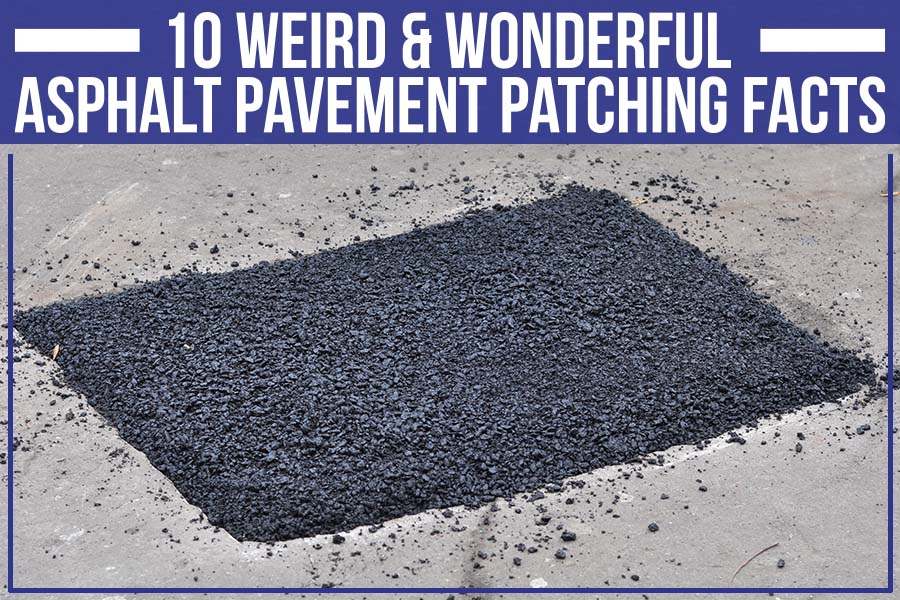
From potholes to alligator cracks, you might need to patch your asphalt for several reasons. Don’t be surprised to learn that asphalt patching is a pretty fascinating process.
Here are ten weird and wonderful facts from 309 Paving Services, professional asphalt patching providers in Normal, IL, about asphalt patching that you may not know!
1. Most Recycled Material
Asphalt is recyclable, but did you know it is the most recycled material in the world? The asphalt pavement industry recycles more than 100 million tons yearly!
2. Quick and Cost-Effective
Asphalt patching is one of the quickest and most cost-effective ways to repair damage to your asphalt. With other methods where you need to replace the asphalt, patching can often be done in a matter of hours.
3. Cold Patch Asphalt
A cold patch of asphalt is an excellent option for minor repairs. Anyone can do it, even if you’re not a professional! The cherry on top? The method is simpler and easier than you think. All you need is the material and some elbow grease.
4. Driveway Crack Filler
Driveway crack filler can help prevent further damage to your asphalt and extend its lifespan. Now all those cracks in your driveway won’t just be unsightly; they’ll protect your asphalt from additional wear and tear.
5. Variety of Materials
Asphalt comprises various materials, including stone, sand, gravel, and bitumen. This seemingly simple mixture is what makes asphalt so durable and long-lasting.
6. Etymology of Asphalt
The root of the word asphalt comes from the Greek word “asphalt,” which means secure or safe. No wonder it is so popular for paving driveways and roads.
7. Natural Flexibility
Crack filling takes advantage of the asphalt’s natural flexibility to help prevent further cracking and deterioration. This patching technique helps to “seal” the cracks so that water and other debris cannot enter.
8. Sustainability
The shifting focus on eco-friendly and sustainable practices has led to an asphalt resurgence. Asphalt is a highly sustainable paving material available, especially if you go with advanced techniques such as infrared patching.
9. Cold Patching Can Be A DIY
Where it’s always recommended to rely on professional help regarding asphalt maintenance, cold patch asphalt is one repair you can do yourself with great success. You can find this type of asphalt at most hardware stores easily.
10. Durable and Long-Lasting
You may know that asphalt driveways are durable and long-lasting, but did you know that asphalt pavements can last up to 30 years? When you compare that to other paving materials, asphalt is the way to go in terms of longevity.
End Note:
We hope you found these asphalt patching facts exciting and helpful. If your driveway needs repair, now is the perfect time to avail yourself of professional asphalt patching services in Normal, IL.
309 Paving Services, serving Normal, IL, can help you with any further queries you may have. When it comes to asphalt patching, we provide top-notch and excellent service you can’t find anywhere else.
Let our team help you or get a free estimate to get started!
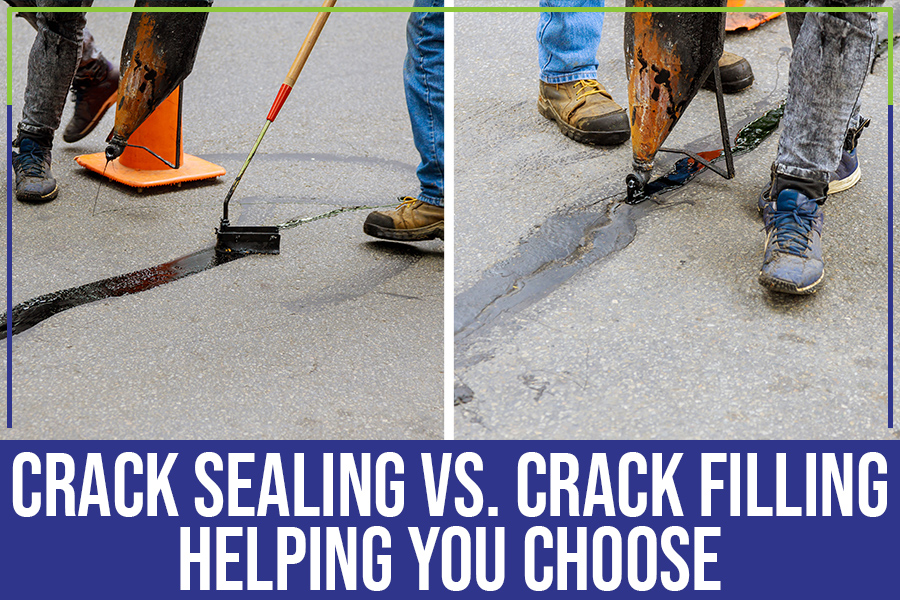
If your driveway looks a little like the moon’s surface, you’re dealing with cracks. And if you’re trying to choose between crack sealing and crack filling, 309 Paving Services can help you choose the best option. If you need asphalt paving services near Bloomington, they can help you with that too.
Both crack filling and sealing can help prevent water seepage and extend the life of your driveway, but they vary in terms of cost, the time required, and results. In this post, we want to help clear up the confusion and help you choose the best option for your pavement.
What is Crack Sealing?
Crack sealing is when hot tar is applied to the cracks in your driveway. This filling material then cools and hardens, creating a seal that will prevent water from seeping through. Crack sealing is much more expensive than crack filling, but it typically lasts longer and provides a better overall seal.
What is Crack Filling?
Crack filling is a process in which cold tar is applied to the cracks in your driveway. This filling material then hardens, creating a seal that will prevent water from seeping through. Crack filling is cheaper than crack sealing, but it does not typically last as long and does not provide as good an overall seal.
Crack Sealing vs. Crack Filling:
Affordability
Crack sealing is usually the more affordable option, requiring less time and materials. Crack filling is usually more expensive, requiring more time and materials. However, the repair cost will vary depending on the size and severity of the cracks. Contact 309 Paving Services today for an estimate.
Time Required
Crack sealing can be done in one day, and you can typically expect the seal to last for three to five years. Crack filling takes a little longer, as the cracks need to be cleaned out before you can fill them. But once the cracks are filled, they should last for at least seven years.
Results
Crack sealing will typically result in a smoother finish, as the sealant will fill in any irregularities in the surface of the crack. Crack filling, on the other hand, will result in a slightly raised surface, as the filler will settle into the crack. But both methods will help to prevent water and debris from entering the crack and causing further damage.
What’s the Best Way to Repair a Crack: Sealing or Crack Repair?
The best way to repair a crack will depend on the size of the crack and the type of surface it is on. For example, cracks in concrete can be repaired with either Crack Sealing or Crack Filling, but it would be best if you fill asphalt cracks. And while both methods can extend the life of your pavement, Crack Sealing is generally considered more preventative. Despite that, Crack Filling is a more reactive measure.
Final Verdict:
So, what’s the verdict? Crack sealing or crack filling for asphalt pavement? The answer is: it depends. If you have a lot of small cracks, fill them with a sealant. Should there be fewer but bigger cracks, use filler to patch them up.
And if you want the most long-lasting solution, combine the two methods! 309 Paving Services can help you choose the correct method for your needs and provide a free estimate to get started on fixing those pesky pavement problems. Have questions about which method is best for your driveway or parking lot? Contact us today!

Whenever you have some pavement work that needs to be done, it is important to hire the right asphalt contractor for the job. There are a lot of contractors out there who claim to do quality work, but you must do your homework so you can safeguard your property and your wallet! This includes asking them the right questions before you sign any contracts. 309 Paving Services brings you some essential questions that you should ask a pavement contractor before employing them for your project.
1. What Is the Estimated Price of The Project?
You need to know how much the project will cost from start to finish. This includes the costs of materials, labor, and other fees associated with the project.
2. What is the Estimated Timeline for The Project?
You need to know how long it will take for the project to be completed. This will help you plan accordingly and ensure there are no delays in completing the work.
3. Do You Provide a Warranty?
Make sure you ask about the warranty on the work being done. This will protect you in case something goes wrong with the work that they did. Don’t hire a contractor who doesn’t guarantee their work!
4. What Are the Payment Terms?
You need to know when you will be expected to pay for the work and how much you will be expected to pay. This will help you budget for the project and avoid any financial surprises. Never hire a contractor who demands total payment upfront.
5. What Is the Scope of Work?
Make sure that you comprehend exactly what is included in the scope of work for the project. This will help you develop the right expectations of what to expect and avoid any misunderstandings.
6. What Are the Risks?
Be sure to ask about any risks that are associated with the project. This will help you be aware of any potential problems that could occur.
7. Are You Licensed and Insured?
A professional contractor will have the necessary licenses to do the work. Also, a contractor should be insured, else any accidents that occur during the project will be billed to you. Never hire a contractor who is not licensed or insured.
8. Can You Provide Some References?
A reputable contractor will gladly provide you with references. Make sure to call up their previous customers so you can get an idea of the quality of their work. If a contractor is hesitant to provide references, it is a clear red flag.
Asking these questions will help you ensure that you are hiring a reputable and qualified contractor for your pavement project. Make sure to take your time choosing a contractor, and don’t be afraid to ask questions. A good contractor will be happy to answer any questions you have.
Let 309 Paving Services Help You!
309 Paving Services serving Morton and the surrounding areas, is a family-owned business that has been in operation for over 15 years. We are a full-service asphalt paving contractor specializing in residential, commercial, and industrial projects.
We would be happy to provide you with a free estimate for your next project. Contact us today!


